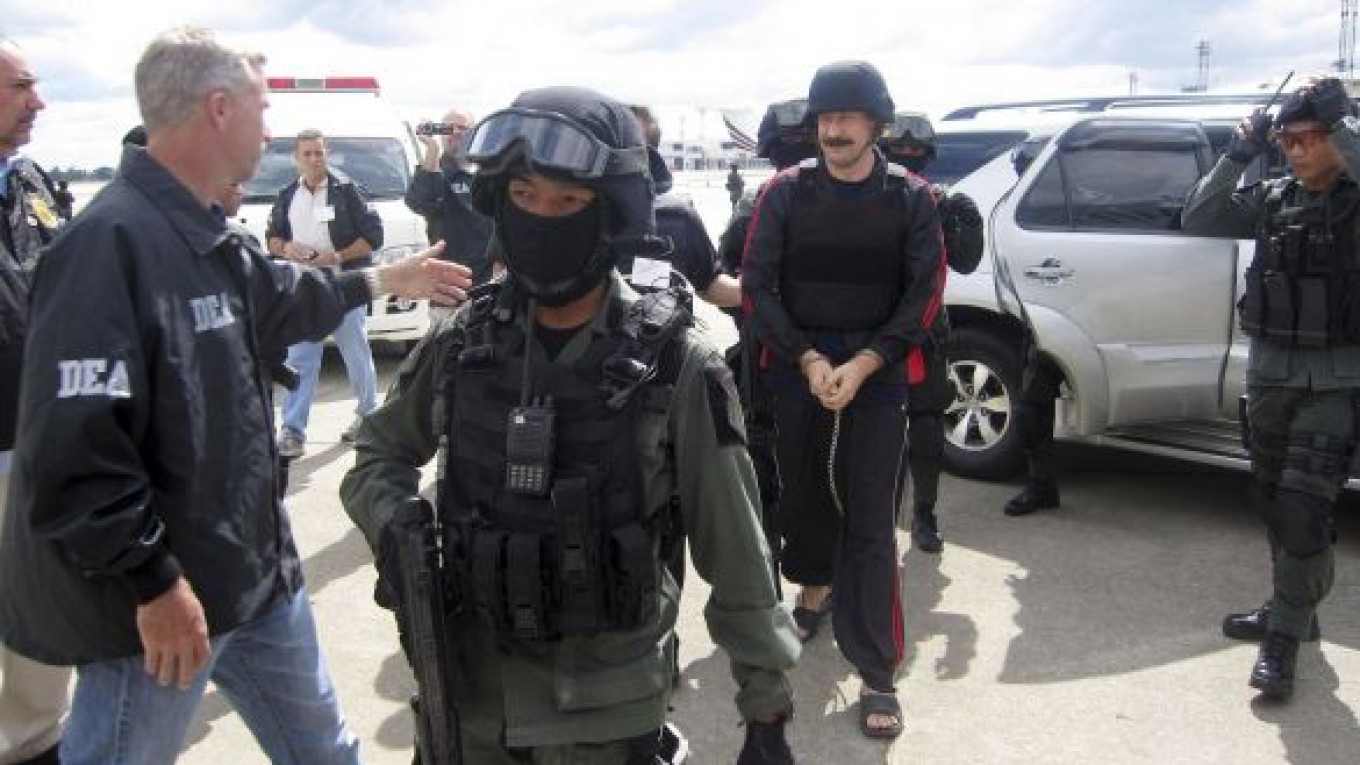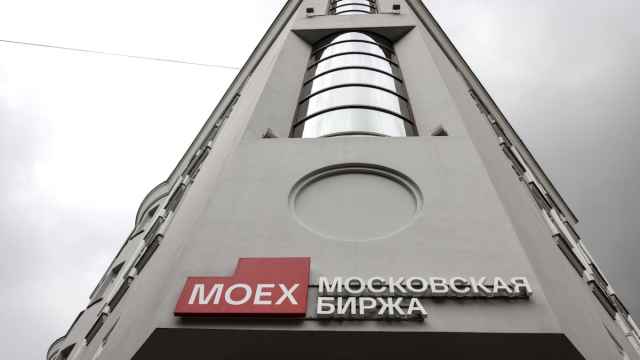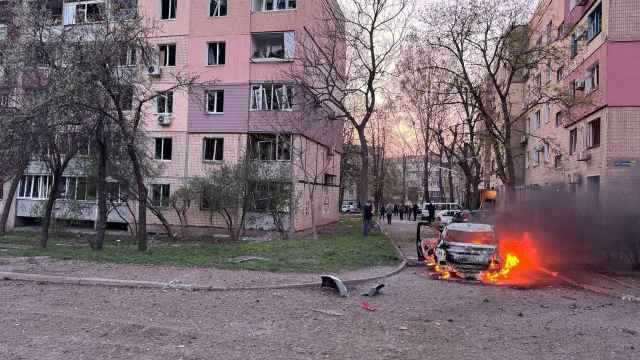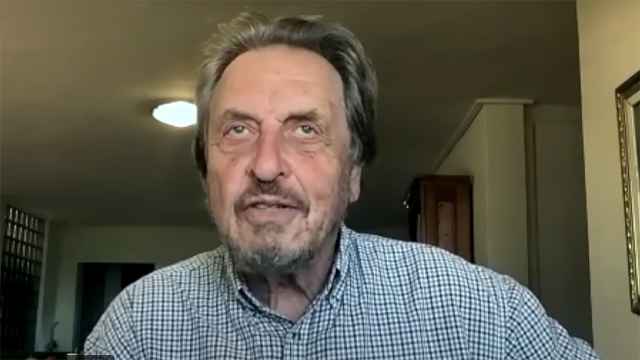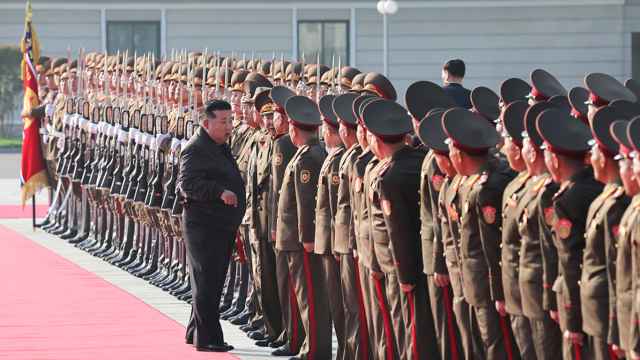Reputed arms trafficker Viktor Bout was whisked out of Thailand to face trial in the United States on Tuesday without the knowledge of his lawyer, the Russian Embassy or his wife, prompting Russian accusations that Bangkok had caved in to Washington.
A convoy of police cars drove Bout, wearing a tracksuit, sandals and a metal army helmet, from the Bangkwang high-security prison to the Bangkok airport, where he was put on a charter plane at about 1:30 p.m. local time.
Accompanied by six U.S. officials and two pilots, he was due to land in New York late Tuesday.
Bout's wife, Alla, rushed to the prison when she heard the unexpected news that Thai Prime Minister Abhisit Vejjajjiva's Cabinet had approved a U.S. request to extradite her husband to face terrorism charges, but she arrived too late.
"This morning a decision — a political decision — with no sort of legal basis was made by the Cabinet," she told Rossia 24 television.
The Russian Embassy was not informed prior to Bout's transfer, and the head of its consular department, Andrei Dvorkin, expressed surprise over the extradition. "All this was done very fast, urgently and, one gets the feeling, secretly," he told Interfax.
The Russian Foreign Ministry, which had fought extradition since Bout's arrest in a 2008 sting operation in Bangkok, denounced the Thai decision as illegal and said it "can have no rational explanation or justification."
"It is to our regret that Thai authorities caved in to external political pressure and implemented the illegal extradition of V. Bout," the Foreign Ministry said in a statement.
Speaking on state television, Foreign Minister Sergei Lavrov said: "This whole saga is taking the form of a flagrant injustice."
Bout, who has denied wrongdoing, is believed to have sensitive information that could prove damaging to senior Russian officials, including perhaps Deputy Prime Minister Igor Sechin.
U.S. State Department spokesman P.J. Crowley told reporters on Washington on Tuesday that he expected the extradition would create "ripples" but voiced hope that it would not upset a lauded "reset" of U.S.-Russian ties.
Bout and the Russian government say he is nothing more than a businessman who bought surplus Antonov and Ilyushin cargo planes to set up an air freight business in the 1990s.
U.S. and UN investigators, however, say Bout appears to have sold arms that fueled conflicts in Angola, Liberia and Sierra Leone in the 1990s.
Bout was also active in Afghanistan, first delivering weapons to the Northern Alliance, the tribal grouping fighting the Taliban, but later supplying the Taliban as well, according to a Los Angeles Times investigation in 2002. The report also linked Bout to the delivery of Russian-made An-12 planes to Kabul. Destroyed by bombing in 2001, the planes were used to disperse the Taliban's heavy military equipment around the country before the U.S. invasion.
Following an Interpol arrest warrant in 2000, Bout, who speaks five languages, took refuge in Moscow. He quickly proclaimed his innocence in an interview with Ekho Moskvy radio.
He narrowly escaped arrest several times. The United Nations has said Bout owns multiple passports and has traveled under various aliases, including Bont, Butt, Bontov, Budd and Bouta.
In a 2005 report, U.S. think tank Stratfor linked Bout's presence in Africa with that of Sechin, who worked in Mozambique and Angola in the 1980s. Bout in 2009 denied ever meeting Sechin.
Bout, 43, was arrested after U.S. agents posing as members of Revolutionary Armed Forces of Colombia negotiated an arms deal with him for surface-to-air missiles, 5,000 AK-47 rifles and small planes that could be equipped with grenade launchers, U.S. investigators say.
Bangkok had been under intense pressure from both Russia and the United States over Bout's case, which has been overtly politicized from the outset. "I am in a tough position," the presiding judge, Jitakorn Patanasiri, told prosecutors in March, according to The Associated Press. "When all this comes to an end, I might not be able to get an entry visa to either country."
Russia sold cheap oil to Thailand last year and has talked of selling it fighter jets.
Washington's desperation to extradite Bout was visible in October when it leveled new charges amid fears that he might be released. The United States even had a plane idling on a Bangkok runway ready to pick up Bout in August, when Bangkok first cleared the way for the extradition. A final decision on the extradition had been expected Friday.
If convicted in the United States, Bout could face life imprisonment.
Despite speculation about embarrassing revelations for the Kremlin in open court or a plea bargain by Bout to avoid a long prison term, analysts said the case was unlikely to aggravate U.S.-Russian relations.
"For Barack Obama and Dmitry Medvedev, it is a personal matter to reset relations between the two countries, and they will not allow this scandal to set back the process," said Igor Korotchenko, an analyst with the Center for Analysis of International Arms Trade, a Moscow think tank.
He said last summer's spy scandal, which saw the United States return 10 Russian agents in a spy swap, was a far more severe test of ties but concluded peacefully.
Korotchenko added that he doubted Bout was privy to information that could embarrass the government.
"Vladimir Putin established Rosoboronexport 10 years ago as the government arms-trading monopoly with the precise goal of getting rid of the many types like Bout who were in this business in the early 1990s," he said. "Bout might have ties to some Russian official, but it would be wrong to consider him a government agent."
Nikolai Zlobin, an analyst with the World Security Institute, a Washington-based think tank, said what happens next will depend on whether Bout has sensitive information needed by the United States.
"The United States firmly believes that he has such information, and that is why Washington sternly refused to jointly work with Moscow over the Bout issue," he said.
Bout is likely to be extremely knowledgable about gray international arms-trading schemes and of the rogue militant groups with which he is believed to have cooperated, Korotchenko said.
Staff writer Nabi Abdullaev contributed to this report.
A Message from The Moscow Times:
Dear readers,
We are facing unprecedented challenges. Russia's Prosecutor General's Office has designated The Moscow Times as an "undesirable" organization, criminalizing our work and putting our staff at risk of prosecution. This follows our earlier unjust labeling as a "foreign agent."
These actions are direct attempts to silence independent journalism in Russia. The authorities claim our work "discredits the decisions of the Russian leadership." We see things differently: we strive to provide accurate, unbiased reporting on Russia.
We, the journalists of The Moscow Times, refuse to be silenced. But to continue our work, we need your help.
Your support, no matter how small, makes a world of difference. If you can, please support us monthly starting from just $2. It's quick to set up, and every contribution makes a significant impact.
By supporting The Moscow Times, you're defending open, independent journalism in the face of repression. Thank you for standing with us.
Remind me later.



